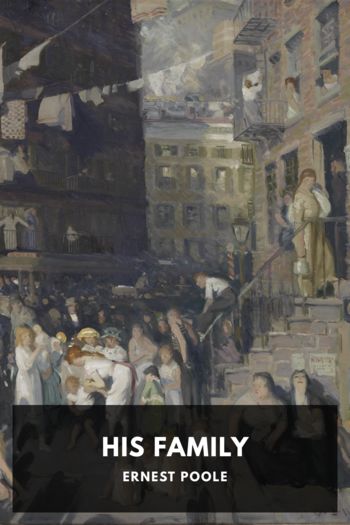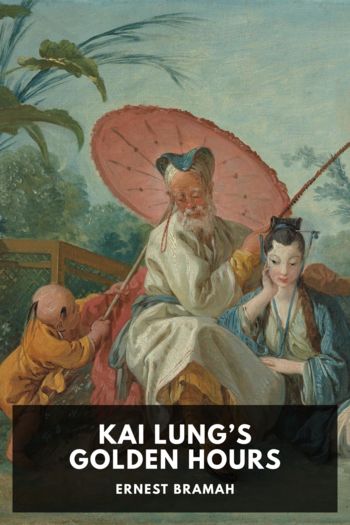His Family - Ernest Poole (ereader for comics .txt) 📗

- Author: Ernest Poole
Book online «His Family - Ernest Poole (ereader for comics .txt) 📗». Author Ernest Poole
Now even more than ever before, her work came crowding into his home. The house was old, but the house was new. For from schools and libraries, cafés and tenements and streets, the mighty formless hunger which had once so thrilled her father poured into the house itself and soon became a part of it. He felt the presence of the school. He heard the daily gossip of that bewildering system of which his daughter was a part: a world in itself, with its politics, its many jarring factions, its jealousies, dissensions, its varied personalities, ambitions and conspiracies; but in spite of these confusions its more progressive elements downing all distrusts and fears and drawing steadily closer to life, fearlessly rousing everywhere the hunger in people to live and learn and to take from this amazing world all the riches that it holds: the school with its great challenge steadily increasing its demands in the name of its children, demands which went deep down into conditions in the tenements and ramified through politics to the City Hall, to Albany, and even away to Washington—while day by day and week by week, from cities, towns and villages came the vast prophetic story of the free public schools of the land.
And meanwhile, in the tenements, still groping and testing, feeling her way, keeping close watch on her great brood, their wakening desires, their widening curiosities, Deborah was bringing them, children, mothers and fathers too, together through the one big hope of brighter and more ample lives for everybody’s children. Step by step this hope was spread out into the surrounding swamps and jungles of blind driven lives, to find surprising treasures there deep buried under dirt and din, locked in the common heart of mankind—old songs and fables, hopes and dreams and visions of immortal light, handed down from father to son, nurtured, guarded, breathed upon and clothed anew by countless generations, innumerable millions of simple men and women blindly struggling toward the sun. Over the door of one of the schools, were these words carved in the stone:
“Humanity is still a child. Our parents are all people who have lived upon the earth—our children, all who are to come. And the dawn at last is breaking. The great day has just begun.”
This spirit of triumphal life poured deep into Roger’s house. It was as though his daughter, in these last months which she had left for undivided service, were strengthening her faith in it all and pledging her devotion—as communing with herself she felt the crisis drawing near.
XLThere came an interruption. One night when Deborah was out and Roger sat in his study alone, the maid came in highly flustered and said,
“Mr. Gale! It’s Miss Laura to see you!”
He turned with a startled jerk of his head and his face slowly reddened. But when he saw the maid’s eager expression and saw that she was expecting a scene, with a frown of displeasure he rose from his chair.
“Very well,” he said, and he went to his daughter. He found her in the living room. No repentant Magdalene, but quite unabashed and at her ease, she came to her father quickly.
“Oh, dad, I’m so glad to see you, dear!” And she gave him a swift impetuous kiss, her rich lips for an instant pressing warmly to his cheek.
“Laura!” he said thickly. “Come into my study, will you? I’m alone this evening.”
“I’m so glad you are!” she replied. She followed him in and he closed the door. He glanced at her confusedly. In her warmth, her elegance, an indefinable change in the tone and accent of her high magnetic voice, and in her ardent smiling eyes, she seemed to him more the foreigner now. And Roger’s thoughts were in a whirl. What had happened? Had she married again?
“Is Edith here still?” she was asking.
“No, she’s up in the mountains. She’s living there,” he answered.
“Edith? In the mountains?” demanded Laura, in surprise. And she asked innumerable questions. He replied to each one of them carefully, slowly, meanwhile getting control of himself.
“And Deborah married—married at last! How has it worked? Is she happy, dad?”
“Very,” he said.
“And is she still keeping up her schools?”
“Yes, for the present. She’ll have to stop soon.” Laura leaned forward, curious:
“Tell me, dad—a baby?”
“Yes.” She stared a moment.
“Deborah!” she softly exclaimed; and in a moment, “I wonder.”
“What do you mean?” her father asked, but Laura evaded his question. She plied him with her inquiries for a few minutes longer, then turned to him with a challenging smile:
“Well, father, don’t you think you had better ask me now about myself?” He looked away a moment, but turned resolutely back:
“I suppose so. When did you land?”
“This morning, dear, from Italy—with my husband,” she replied. And Roger started slightly. “I want you to meet him soon,” she said.
“Very well,” he answered. At his disturbed, almost guilty expression Laura laughed a little and rose and came over and hugged him tight.
“Oh, but, father dearest—it’s working out so splendidly! I want you to know him and see for yourself! We’ve come to live in New York for a while—he has more to do here about war supplies.”
“More shrapnel, eh, machine guns. More wholesale death,” her father growled. But Laura smiled good-naturedly.
“Yes, love, from America. Aren’t you all ashamed of yourselves—scrambling so, to get rich quick—out of this war you disapprove of.”
“You look a bit rich,” her father retorted.
“Rather—for the moment,” was her cheerful answer.
“And you still like living in Italy?”
“Tremendously! Rome is wonderful now!”
“Reborn, eh. Wings of the Eagles.”
“Yes, and we’re doing rather well.”
“I haven’t noticed it,” Roger said. “Why don’t you send a few of your troops to help





Comments (0)